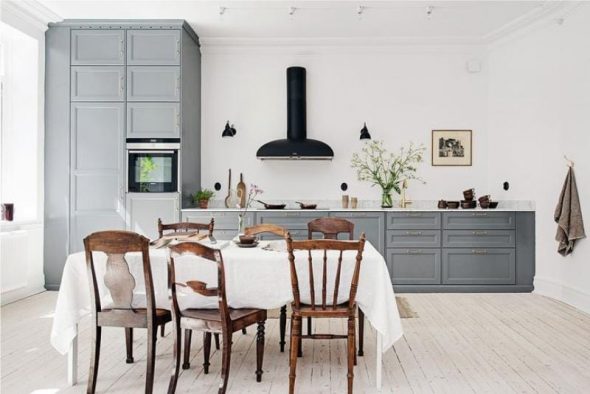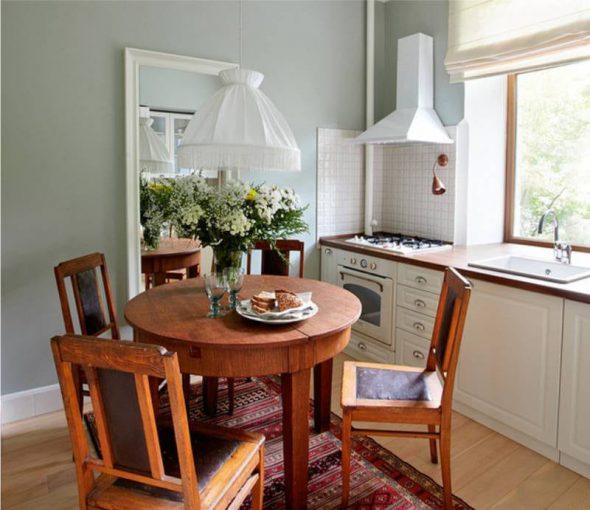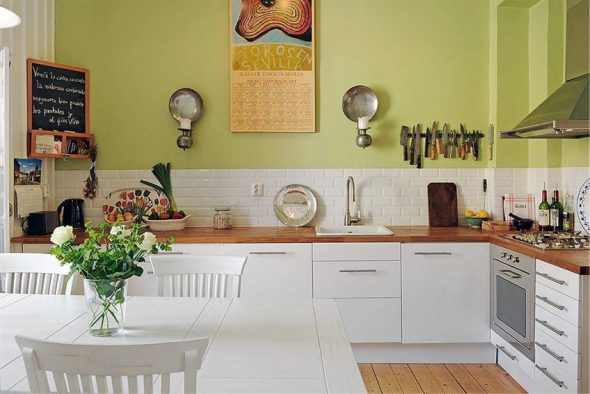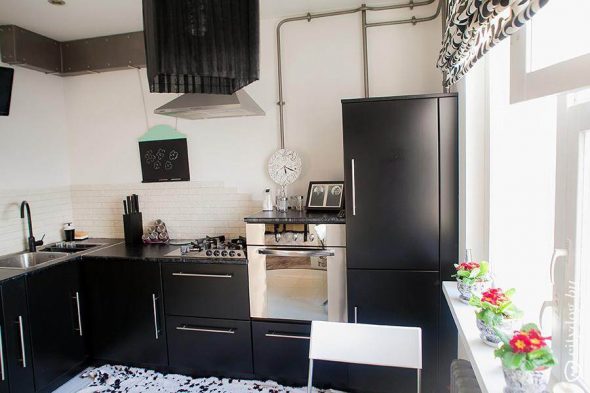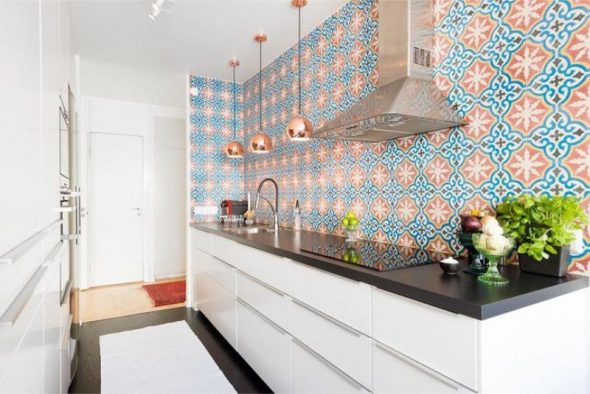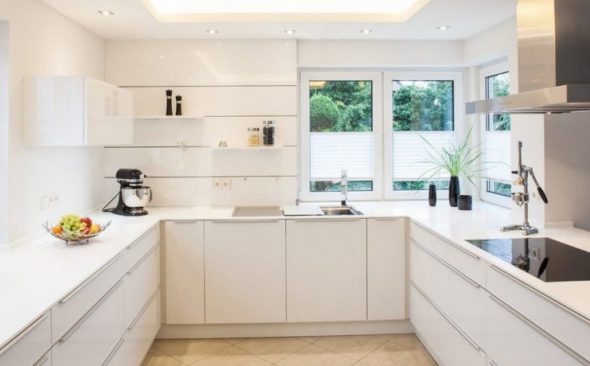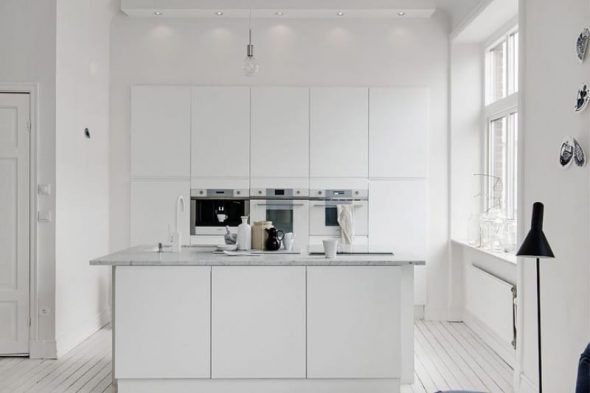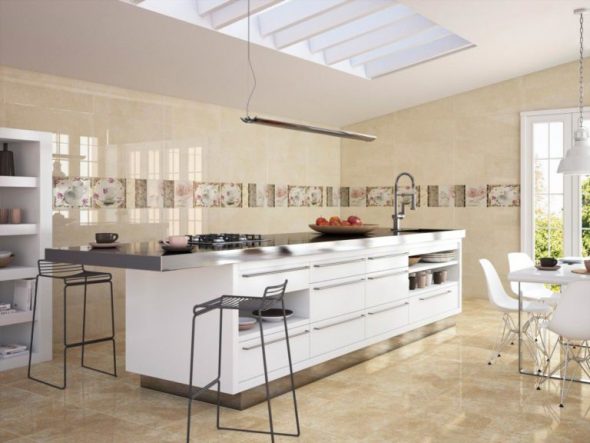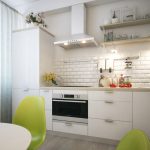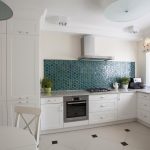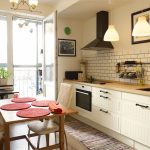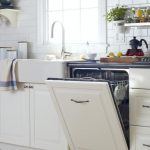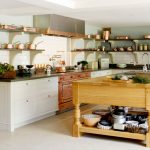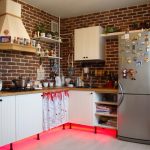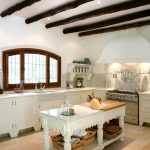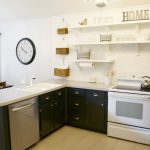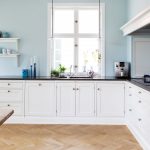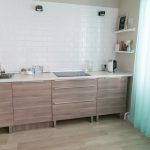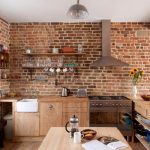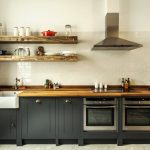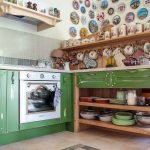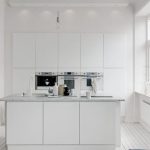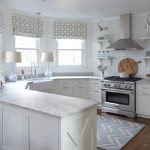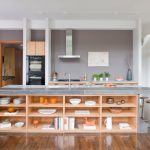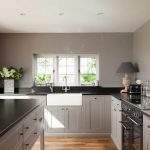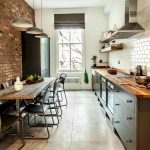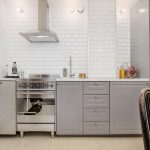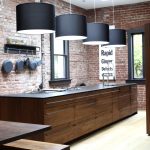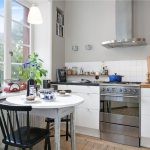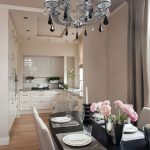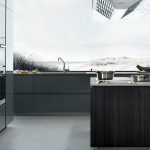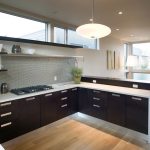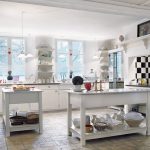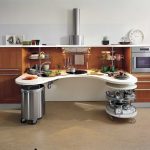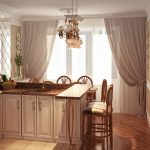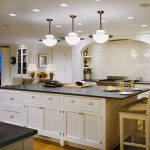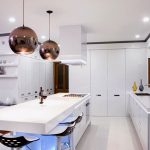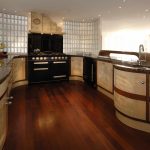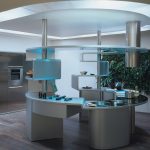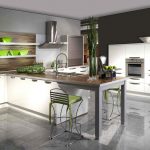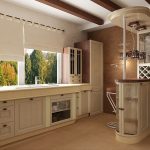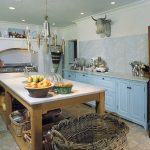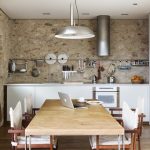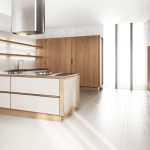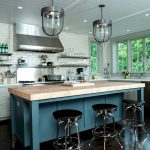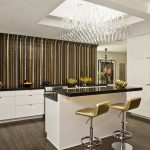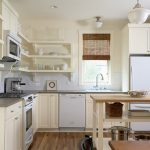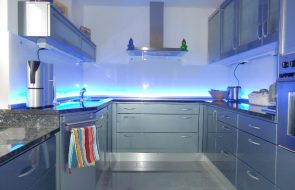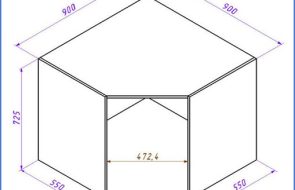What is the most important thing in kitchen furniture planning? Of course, a large work space and sufficient storage space. It often happens that the necessary accessories are placed in the lower cabinets and cupboards, so the wall cabinets turn into an unnecessary element of the set. It is not necessary to install upper cabinets just because it is supposed to be so. These are old stereotypes.
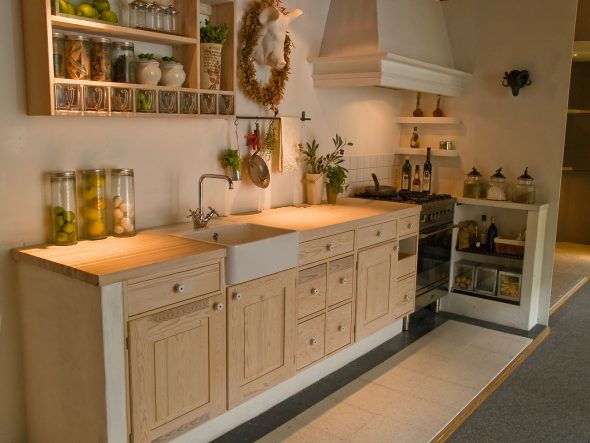
Nowadays, standard kitchen units are going out of fashion, more are made to order, taking into account the client's wishes. You can choose the model you like or come up with your own. If the layout is difficult, contact a designer. If you think that upper cabinets are not necessary, you can do without them. But it is worth thinking about the advantages and disadvantages of such a layout in advance. Decide where the dishes, food, and other necessary attributes will be located.
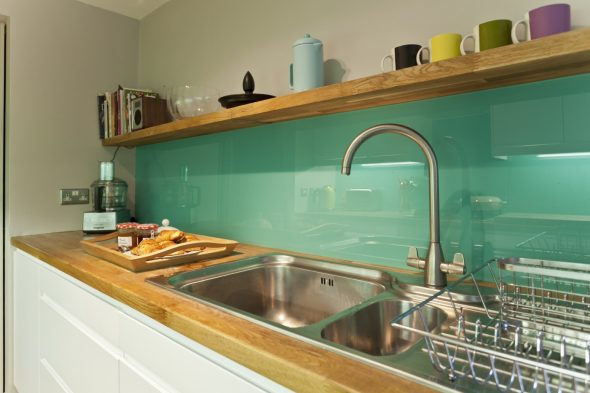
Content
- Advantages and disadvantages
- Types of kitchens without upper cabinets
- What to pay special attention to when choosing
- Dimensions of the kitchen without upper cabinets
- What is special about them and how to use them in the interior?
- Video: Kitchen design without upper cabinets
- 50 original and beautiful kitchen units without wall cabinets in various styles:
Advantages and disadvantages
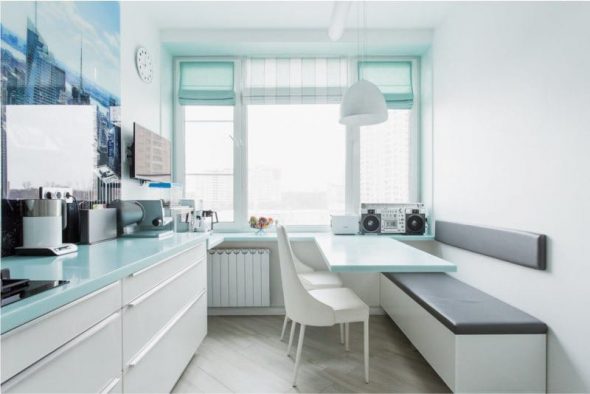
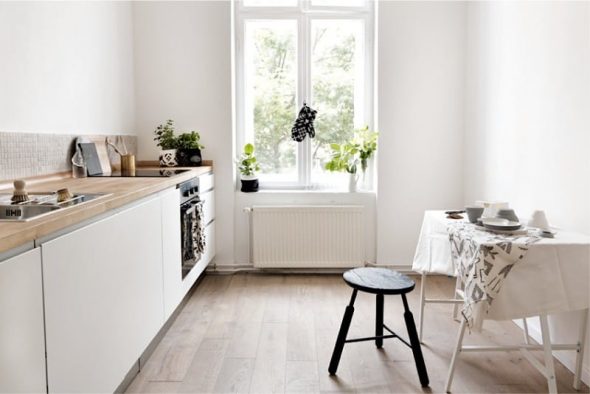
Let's consider all the nuances of such a kitchen.
| Advantages | Flaws |
| Good lighting. The cooking area is bright enough to make cooking comfortable. | Sometimes there is not enough space for storage. When the dimensions of the lower cabinets are insufficient, there is a need for wall cabinets. For small spaces, it is better to purchase a full set. |
| Lots of space. A kitchen without wall cabinets visually increases in size. | |
| Less time is spent on cleaning due to the absence of upper cabinets, which are constantly dirty and difficult to clean. And the surface above the work area is mainly covered with ceramic tiles, it is easier to clean, as is the hood | Any imperfections, be it dirt or stains, become visible. Upper cabinets make these imperfections less noticeable, as they shade the surface of the tables. |
| Economy. You won't have to pay for many pieces of upper furniture. A kitchen without upper cabinets will cost less. | |
| Reliability. Sometimes hanging furniture can fall due to overload. Without it, this will not happen. | If you have installed shelves above the work surface, then frequent cleaning is guaranteed, as dust will constantly accumulate on them. For small kitchens, it is advisable to hang several cabinets. |
| Accessibility. Not everyone can reach the top cabinet for the thing they need. Desks with deep drawers are suitable for everyone. |
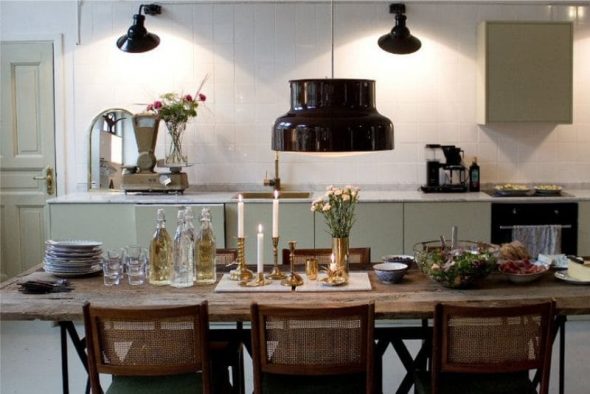
Types of kitchens without upper cabinets
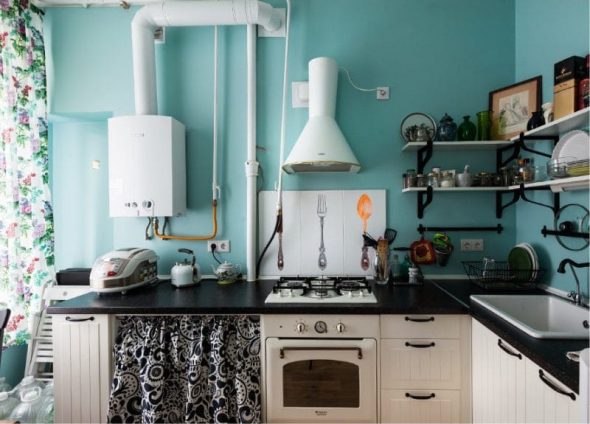
Furniture stores offer a wide range of kitchen units without upper cabinets or with the least number of them. It should be noted that most units are equipped with large column cabinets, where there is space for built-in household appliances, and capacious storage modules. Due to the arrangement of floor modules, there are a number of basic alternatives for the design of the interior of the kitchen without upper cabinets.
- Rectilinear placement. Floor furniture is placed along any wall of the room, covering it with one tabletop. In a similar way, equip a comfortable work area for cooking with a sink, a built-in hob, or allocate a place for preparing and cutting products. This layout allows you to place high modules diagonally or oppositely.
Linear - a scheme where floor cabinets are arranged in one line along one wall, completely or partially The work area with the sink and hob in such a kitchen are located next to each other - Corner arrangement. Differs from the above in that the set is installed near two adjacent walls, i.e. they capture the angle of the room. Thus, an L-shaped module is formed, in which the column cabinets are located at a certain distance from the other wall.
Corner – a rational and convenient option for placing kitchen furniture Corner kitchen design in black without upper modules - U-shaped arrangement. The floor furniture of the kitchen set takes up two or three adjacent walls. This type of design is suitable for square or rectangular rooms of standard or large footage.
The parallel furniture layout is suitable for very spacious or long narrow kitchens. A kitchen without upper cabinets in this layout has enough storage space for kitchen utensils and household appliances. - Island placement. Cabinet modules are concentrated in the middle of the kitchen like an "island" connected by a common countertop that serves as a work area. The structure is used for cooking or used as a dining area. To make cooking comfortable, column cabinets should be placed nearby. But the kitchen should have a large footage.
Island - in this case, the main work surface is the island in the center of the kitchen For owners of a large kitchen, such furniture will add a special charm to the interior without wall cabinets
What to pay special attention to when choosing
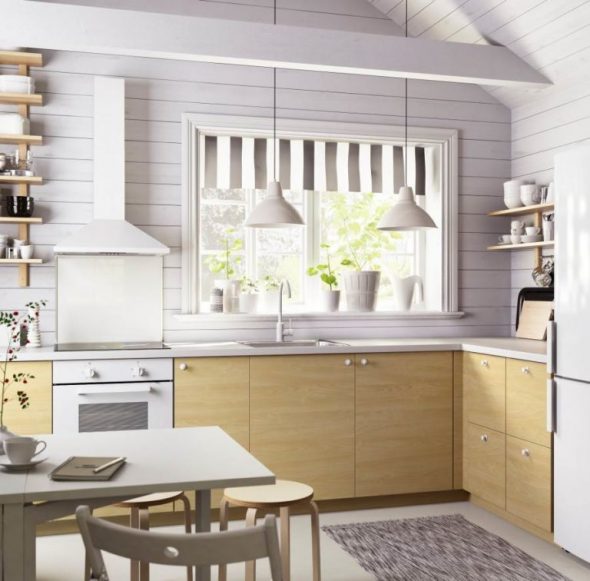
Errors in kitchen design can cause all the utensils, household equipment and dishes to not fit into the new furniture. Another option is acceptable - everything without exception is put away in cabinets and arranged according to sections, and fifty percent of the drawers are empty, taking up the necessary space. But this option can be excluded if you order a kitchen set where hanging cabinets are not provided.
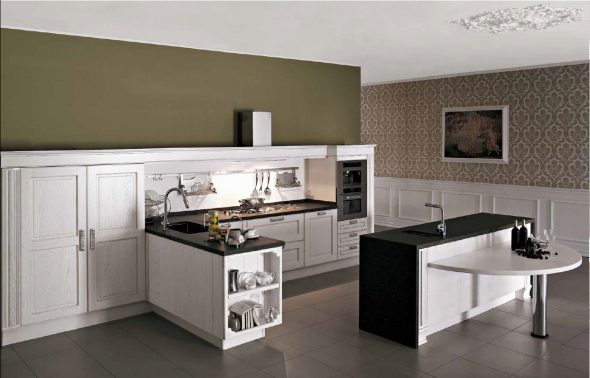
In this case, a number of factors should be taken into account.
Competent selection of lower modules: in the absence of hanging cabinets, most of the items must be placed in the lower ones, therefore, when you order furniture, choose the appropriate cabinets with drawers, shelves and sections.
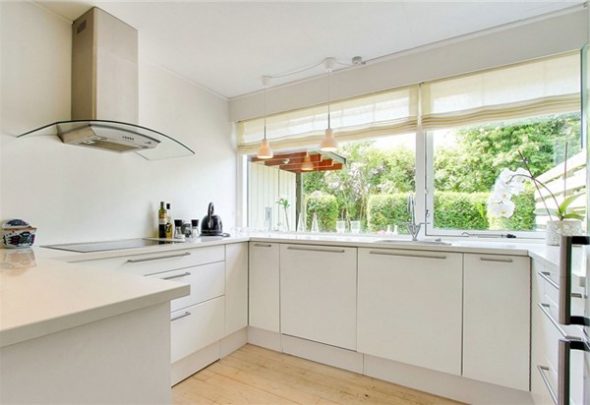
When thinking about the design, due attention must be paid to the interior decoration; in the absence of upper cabinets, a significant part of the walls will be visible.
If the kitchen is small, you cannot do without upper cabinets completely, there will be a need to install hanging shelves or a dish dryer. If the kitchen footage allows, place an "island" in the center - this is a special structure that is used as a work area, and if necessary, install a kitchen sink there.
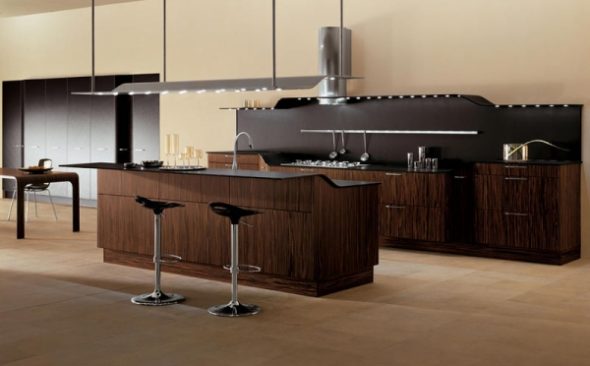
The lack of hanging cabinets results in a lack of storage space for the necessary things. This problem is solved by adding height and depth to the floor modules, calculating the dimensions of the front side of the cabinets. But in this case, a large dining table will no longer fit - there simply won't be enough space.
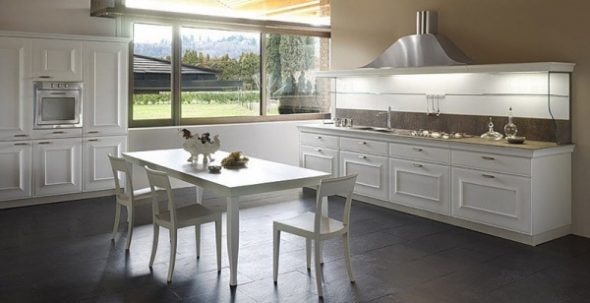
Note: To ensure that there is enough lighting in a kitchen that does not have hanging cabinets with spotlights, install unusual ceiling or movable lamps.
Dimensions of the kitchen without upper cabinets
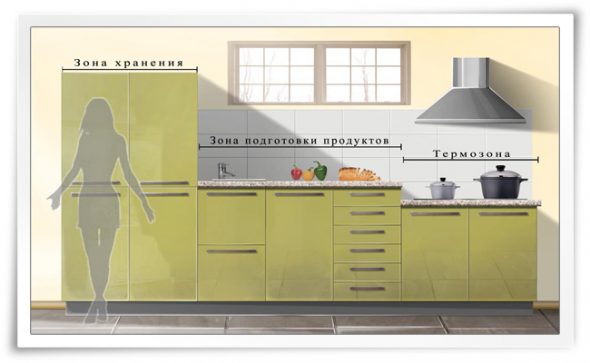
If you are going to buy a kitchen set, it is better to make it to order - this way you will create a unique interior, decide for yourself how many cabinets you need, decide on their size, design and color scheme. You decided to do without upper cabinets, in this case, choose deep lower modules.
Standard sizes.
- The height of the cabinets from the floor to the top of the countertop is 0.85 m, here the thickness of the countertop is also taken into account, it can be different - 2-5 cm.
- The lower plinth is 10 cm wide.
- The width of the table top is 60 cm (distance from the wall to the edge).
- The gap from the edge of the table top to the door front is 5 cm.
- The lower decorative skirting board is installed at a depth of 2-5 cm.
- Most models have tabletops that extend beyond the back wall, the standard gap being 5 cm.
- The optimal depth of the modules is 50 cm, if the tabletop has a ledge – 55 cm.
- In modern models, the width of the cabinets is a multiple of 15 cm, that is, it can be 30, 45, 50, 60, 90 cm, this is the optimal size for built-in appliances.
This is interesting! One of the designers' innovations is multi-level countertops. Ergonomic indicators are provided here, which significantly facilitates the cooking process. For example, the hob should be at a height of 80 cm from the floor, it is more convenient to cut products and work with dough at a height of 90 cm, and it is easier to wash dishes and cut products at a height of 1 m.
What is special about them and how to use them in the interior?
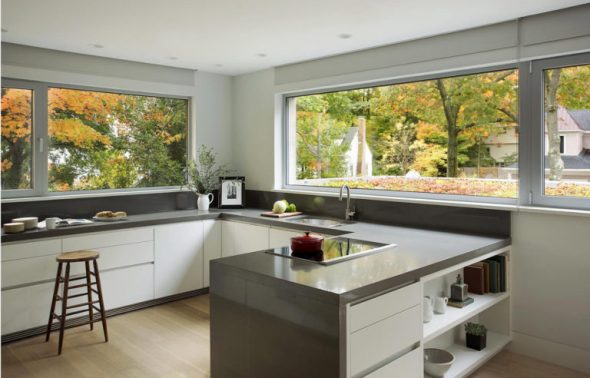
Hanging cabinets are mainly used to store dishes. If the kitchen size allows, you can do without them and install a sideboard. It can differ in color and style from the kitchen set. You can also arrange a pantry here to store various utensils and supplies. A corner is usually allocated for it. If the kitchen set has an angular shape or is located in a straight line, one of the sides can be designed as blind column cabinets to accommodate built-in appliances and a refrigerator. The other side, where the stove and sink are located, is open as much as possible.
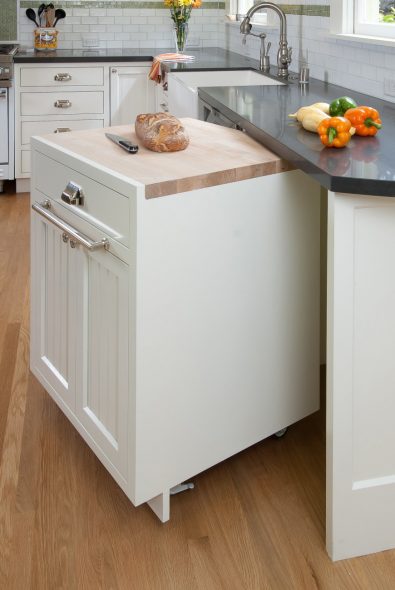
If the kitchen has a loggia or balcony, they can be insulated. This will create additional storage space for kitchen utensils. This option will allow you to do without wall cabinets. If you have a large kitchen, install an "island" equipped with drawers and shelves - you can store dishes there.
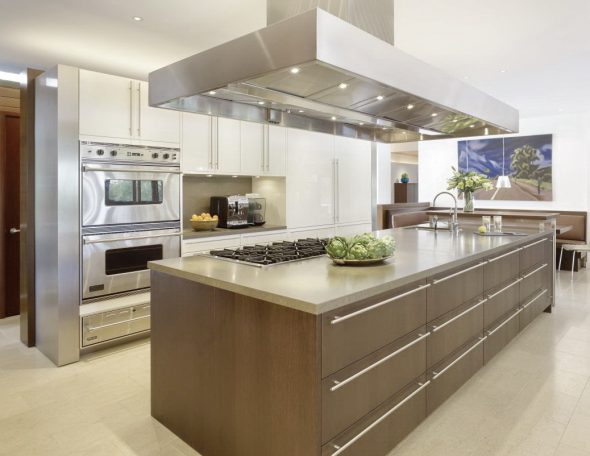
A kitchen without upper cabinets requires high-quality wall finishing, good lighting and a competent selection of kitchen accessories. To protect the walls from dirt, install a protective screen, its height can be different, with a pattern and ornament. Ceramics, stone, MDF or glass are used for it.
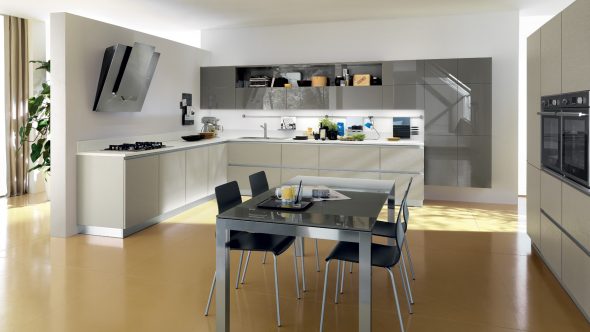
Place shelves on top of the screen to store dishes and other small items. Rails will look good – potholders, tools, boards, spices and other attributes are placed on them. Their position can be vertical or horizontal. Thus, almost all kitchen utensils will be at your fingertips.
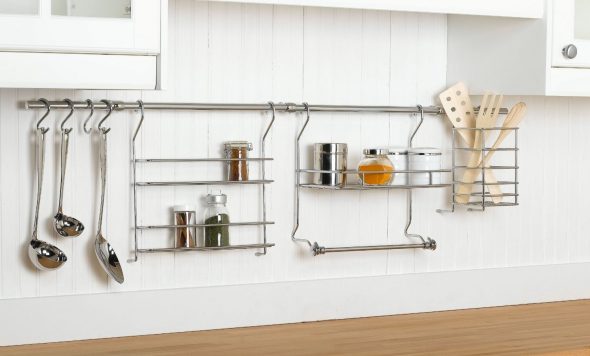
Video: Kitchen design without upper cabinets
https://www.youtube.com/watch?v=k94WCqQhlOY

